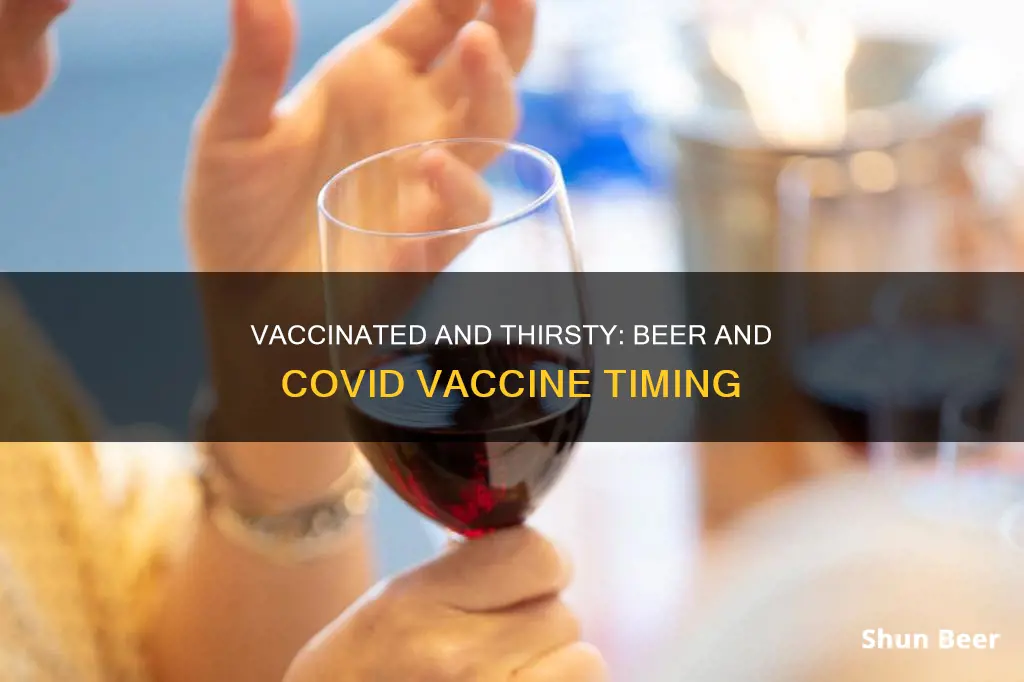
There is no evidence that alcohol impairs the effectiveness of the COVID-19 vaccine. However, some experts advise against drinking alcohol before and after receiving the vaccine. This is because alcohol could increase the likelihood of an allergic reaction to the vaccine. For example, Dr. Purvi Parikh, an immunologist and allergist, recommends avoiding alcohol for at least 24 hours after the vaccine or until any side effects subside. Similarly, Dr. Blanka Kaplan suggests avoiding alcohol for 24 hours before and after vaccination. Overall, while there is no evidence that alcohol will negatively impact the vaccine's efficacy, it may be best to avoid drinking beer or other alcoholic beverages for a brief period before and after receiving the COVID-19 vaccine.
| Characteristics | Values |
|---|---|
| Drinking beer 24 hours after the Covid vaccine | Experts suggest avoiding alcohol before and after receiving the Covid vaccine to avoid any adverse effects on the immune response and to prevent any allergic reactions. However, there is no evidence that alcohol impairs the effectiveness of the vaccine. |
What You'll Learn
- Alcohol may increase the likelihood of an allergic reaction to the vaccine
- Experts recommend avoiding alcohol for 24 hours before and after vaccination
- Alcohol can negatively impact the immune system
- Alcohol may make side effects from the vaccine worse
- There is no evidence that alcohol impairs the effectiveness of the vaccine

Alcohol may increase the likelihood of an allergic reaction to the vaccine
There is currently no official advice or conclusive evidence that alcohol impairs the effectiveness of the COVID-19 vaccine. However, some experts recommend avoiding alcohol before and after receiving the vaccine, citing its potential impact on immune response and the likelihood of allergic reactions.
Purvi Parikh, MD, an immunologist and allergist, explains that alcohol lowers the threshold for allergic reactions. Specifically, alcohol causes blood vessels to expand, leading to inflammation in the body, making individuals more likely to experience an allergic reaction. This is particularly relevant for COVID-19 vaccines, as allergic reactions can occur, although they are rare.
To minimize the risk of an allergic reaction, Dr. Parikh recommends avoiding alcohol the day of the vaccine and for at least 24 hours after, or until any side effects subside. Side effects may include fever, fatigue, muscle and joint pain, and swollen lymph nodes. Dr. Blanka Kaplan, a specialist in adult and pediatric allergy and immunology, agrees, suggesting an even longer timeframe of avoiding alcohol for 24 hours before and after vaccination.
While there is no conclusive evidence linking alcohol consumption to reduced vaccine effectiveness, it is well-known that alcohol affects the immune response. Studies show that alcohol can disrupt immune pathways and impair the body's ability to defend itself. Additionally, excessive alcohol consumption increases the risk of immune-related conditions such as acute respiratory stress syndrome.
Asking for Beer Outside Gas Stations: Does It Work?
You may want to see also

Experts recommend avoiding alcohol for 24 hours before and after vaccination
There is no official recommendation to avoid alcohol before or after receiving a COVID-19 vaccine. However, experts recommend avoiding alcohol for at least 24 hours before and after your vaccination. This is because alcohol can affect the immune system and may increase the likelihood of experiencing a reaction to the vaccine.
Drinking alcohol before and after getting vaccinated may impact your immune response. Alcohol can cause your blood vessels to expand, leading to inflammation in your body, and making you more likely to experience a reaction. While there is no conclusive evidence that alcohol reduces the vaccine's effectiveness, it is known to affect the immune response. Studies show that alcohol can disrupt immune pathways and impair the body's ability to defend itself against infection.
In addition, excessive alcohol consumption can increase the risk of adverse effects from the COVID-19 vaccine. It can also mask the vaccine's side effects, making it difficult to determine whether any symptoms are caused by the vaccine or alcohol. According to the CDC, moderate alcohol consumption is defined as one drink or less per day for women and two drinks per day or less for men. Heavy drinking can suppress the immune system and increase the risk of sickness.
It is worth noting that the effects of alcohol on vaccine response may vary among individuals, and there is still much to learn about the specific interactions between alcohol and the COVID-19 vaccines. If you have concerns or questions about drinking alcohol before or after receiving the COVID-19 vaccine, it is always best to consult with your healthcare provider. They can provide personalized advice based on your medical history and any medications you may be taking.
Drinking Beer on Chicago Streets: What's the Law?
You may want to see also

Alcohol can negatively impact the immune system
There are conflicting opinions on whether it is safe to drink beer 24 hours after receiving the COVID-19 vaccine. While some experts recommend avoiding alcohol before and after the vaccine, others claim that there is no evidence that alcohol impairs the vaccine's effectiveness.
Here's why alcohol can negatively impact the immune system:
Impaired Immune Response
When you drink alcohol, your body prioritizes breaking it down over other functions, including the immune response. Alcohol cannot be stored like macronutrients and must be sent directly to the liver for metabolism. As a result, your body may neglect its immune defence mechanisms, making you more susceptible to infections.
Damage to White Blood Cells
Excessive alcohol consumption can damage the bone marrow, where white blood cells are produced. This results in a lower white blood cell count, making it harder for your body to fight off pathogens and infections. Alcohol can also directly damage white blood cells, specifically macrophages and T-cells, impairing their ability to function properly.
Increased Intestinal Permeability
Alcohol intake can make the lining of the intestinal wall more permeable, leading to a condition known as "leaky gut syndrome." This allows bacteria and toxins to leak into the bloodstream, triggering an immune response and causing chronic systemic inflammation.
Sleep Disturbances
Heavy drinking is often associated with reduced sleep quality and quantity. This lack of adequate, restful sleep can negatively impact your immune system, as sleep plays a crucial role in enhancing the activity of T-cells, which fight against pathogens and viral particles. Poor sleep is also linked to depression and other mental health issues, which can further compromise the immune system.
Nutritional Deficiencies
Chronic alcohol use can lead to vitamin B6 and folate deficiencies, which are essential for a robust immune system. These deficiencies leave your body vulnerable to diseases and infections. Alcohol also impairs the function of B-lymphocytes, the white blood cells responsible for producing antibodies to fight off infections.
Liver Damage
Heavy and prolonged alcohol consumption can cause serious liver damage. The liver is a vital organ for removing harmful substances from the body and plays a crucial role in the immune system. Liver damage can impair its function and make it challenging for the body to defend against pathogens.
In summary, alcohol consumption can negatively impact the immune system by impairing the body's ability to fight off infections, damaging white blood cells, disrupting the intestinal lining, affecting sleep, causing nutritional deficiencies, and damaging the liver. While moderate drinking may not pose the same risks, excessive and binge drinking can suppress the immune system and increase the risk of illnesses and infections.
Beer and Tramadol: A Risky Mix?
You may want to see also

Alcohol may make side effects from the vaccine worse
There is no evidence that alcohol lowers the impact of the COVID-19 vaccine or reduces its efficacy. However, according to Purvi Parikh, an immunologist and allergist with Allergy & Asthma Network, alcohol lowers your threshold for allergic reactions. This is because it causes your blood vessels to expand and leads to inflammation in your body. As a result, you may be more likely to react to the vaccine.
Dr Parikh recommends avoiding alcohol the day of your vaccine and at least for 24 hours after, or until any side effects subside. This is especially important for those receiving the Pfizer or Moderna vaccines, as the second dose is reported to lead to greater side effects. Blanka Kaplan, a specialist in adult and pediatric allergy and immunology from Northwell Health, agrees, suggesting avoiding alcohol for 24 hours before and after your vaccination.
Since there is still much unknown about the COVID-19 vaccines, it is best to err on the side of caution and avoid alcohol around the time of your vaccination to minimise inflammation and the potential for an allergic reaction.
Hydrometer Basics: Crafting Beer Perfection
You may want to see also

There is no evidence that alcohol impairs the effectiveness of the vaccine
There is much debate about whether or not drinking alcohol before or after receiving the COVID-19 vaccine is safe. While some experts suggest that drinking alcohol around the time of your vaccination is not advisable, the Union Ministry of Health and Family Welfare has stated that "there is no evidence of alcohol impairing the effectiveness of the vaccine."
Some experts argue that alcohol consumption can impact your immune response to the vaccine. For example, Purvi Parikh, MD, an immunologist and allergist, has stated that "alcohol lowers your threshold for allergic reactions because it causes your blood vessels to expand and that causes inflammation in your body." As a result, Dr. Parikh recommends avoiding alcohol the day of the vaccine and for at least 24 hours after, or until any side effects subside. Blanka Kaplan, MD, a specialist in adult and pediatric allergy and immunology, agrees with this suggestion and further recommends avoiding alcohol for 24 hours before the vaccination as well.
On the other hand, the Medicines and Healthcare Products Regulatory Agency (MHRA) supports the statement made by the Union Ministry of Health and Family Welfare, claiming that there is no evidence that alcohol reduces the efficacy of the COVID-19 vaccine. Ilhem Messaoudi, director of the Center for Virus Research at the University of California, Irvine, adds that moderate drinking does not pose a risk of lowering the impact of the vaccine on the body.
While there may be conflicting opinions among experts, it is important to note that there is currently no definitive evidence that alcohol consumption impairs the effectiveness of the COVID-19 vaccine. However, heavy alcohol consumption is known to have adverse effects on the human body and can impact the immune system. Therefore, it is always advisable to drink in moderation.
The Science Behind Fizzics Beer: How Does It Work?
You may want to see also
Frequently asked questions
There is no evidence that alcohol impairs the effectiveness of the COVID-19 vaccine. However, heavy drinking can adversely affect the human body and impact the immune system. It is recommended to avoid alcohol for at least 24 hours after the vaccine or until any side effects subside.
Alcohol could increase the likelihood of having a reaction to the vaccine. It lowers the threshold for allergic reactions by causing blood vessels to expand and leading to inflammation in the body.
It is recommended to wait for at least 24 hours after receiving the COVID-19 vaccine before consuming alcohol. Some experts suggest avoiding alcohol until any side effects, such as fever, fatigue, muscle and joint pain, and swollen lymph nodes, subside.
It is recommended to avoid alcohol for at least 24 hours before receiving the COVID-19 vaccine.
If you don't experience any side effects after the COVID-19 vaccine, it is generally considered safe to consume a beer or other alcoholic beverages in moderation. However, it is still advisable to wait for at least 24 hours to let your body recover from the vaccination.







